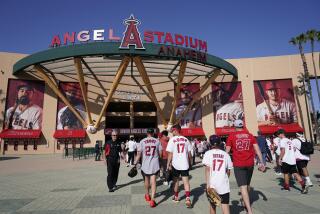Disney wants to end tax incentive deals with Anaheim in an attempt to improve relationship with city
Amid growing animosity between Anaheim and Walt Disney Co., the president of the media giant’s Disneyland Resort asked the city to end all tax incentive deals in hopes of promoting “cooperation and goodwill.”
The move marks an end to the way Disney has long done business in the home town of its original theme park, where a complex relationship has been dotted with subsidies, incentives, rebates and protections from future taxes that public policy experts estimated would be worth more than $1 billion. Disney, Anaheim’s largest employer and taxpayer, has disputed that estimate.
By eliminating certain tax agreements, Disney may be ensuring that it isn’t affected by a Nov. 6 ballot measure that, if passed, would require the resort to pay all its workers a living wage.
In a letter sent to Anaheim’s mayor and City Council, Disneyland Resort President Josh D’Amaro said he was calling for the end to two tax incentive agreements as a way to improve the company’s relationship with the city and its residents.
“Unfortunately in Anaheim, these policies have become divisive, leading to an unstable business climate and a difficult working relationship with the city,” D’Amaro said in a letter dated Aug. 21.
Anaheim Mayor Tom Tait, who has opposed tax breaks for the theme parks, called the request a “bold move” and said he was looking forward to working more cooperatively with Disney in the future.
Disneyland Resort benefits from two tax agreements that are among the deals it has reached with Anaheim.
One prohibits the city from adopting an entertainment tax on the price of admission in exchange for the resort’s promise to invest at least $1 billion by 2024. The Star Wars: Galaxy’s Edge expansion, slated to open next year, meets the resort’s obligation under that deal, which was approved in 2015. Disney California Adventure Park already has announced plans to build another expansion, featuring the superheroes of Marvel comics and movies.
The second tax benefit, adopted in 2016, would give the resort a $267-million rebate on the city’s hotel tax if Disney builds a luxury hotel. The Disneyland Resort drew up plans to build the hotel, which was set to open in 2021, but learned last week that, according to the Anaheim city attorney, the hotel project doesn’t qualify for the break because Disney moved the location of the project after the deal was reached.
Disney representatives then put a hold on the hotel plan and complained that the project still should qualify for the break, despite relocating by about 1,000 feet from its original location.
Tait said the City Council probably would need to take formal action to end the two tax agreements, but he called such a move a formality, considering Disney now has said it doesn’t want the incentives.
Disneyland Resort has been taking heat in the last few months from its workers union, which says the Burbank-based media giant doesn’t pay its employees enough for them to cover basic necessities.
A coalition of unions for resort workers collected enough petition signatures to place on the Nov. 6 ballot a measure that requires all large hospitality businesses that receive a tax subsidy from Anaheim — including Disneyland Resort — to pay a living wage to all workers.
By ending both tax incentive agreements, Disney appears to ensure that the ballot measure — if approved — won’t apply to the resort.
The ballot measure would call for an immediate salary increase to a minimum of $15 an hour, with a $1 hourly increase each Jan. 1 until 2022. If the measure applies to Disneyland Resort, it would mean the pay raise would apply to all 30,000 resort employees who earn less than $15 an hour.
Disneyland representatives point out that the resort already has secured a contract with four of its largest unions to raise hourly wages by as much as 20% immediately and an additional 13% in January.
The contract agreement approved by Disney and the unions increased the minimum hourly rate of $11 for those union employees to $13.25 immediately and will raise it to $15 starting in January. An increase to $15.50 an hour is slated for June 2020.
Disney insists that the call to end all tax incentive agreements with Anaheim is a move to improve relations with the city, not to avoid paying higher wages.
“We want to reset the relationship,” Disney spokeswoman Lisa Haines said.
The Burbank-based company’s decision highlights a shift in how the resort and the city deal with each other, according to Disney watchers.
“I think Disney understands that they are no longer the kingmakers in Anaheim,” said David Huerta, president of SEIU-United Service Workers West, which represents about 40,000 janitors, security officers, airport employees and other service workers in California. “They are now partners with Anaheim.”
A spokesman for a union that represents hotel workers at the resort called the development “a surprise” and said the labor group is not disappointed that the ballot measure may no longer apply to workers in the Disneyland Resort.
Andrew Cohen, a representative for Unite Here, Local 11, said his group will continue to push Disney to pay its workers a living wage, either through a ballot measure or through contract negotiations.
“We are still calling on Disney to do what we think is right and lift those people out of poverty,” he said.
Disney is a major economic engine for Anaheim and has invested heavily in its properties with the city’s help over the years, as was detailed in an analysis last year by the Los Angeles Times.
In 1996, for instance, Anaheim agreed to issue $510 million in bonds to finance various infrastructure improvements, the expansion of the Anaheim Convention Center and the construction of the $108.2-million Mickey & Friends parking structure, which Disney needed for California Adventure and other projects.
When the 40-year bonds — which include roughly $1.1 billion in interest — are paid off, Anaheim will transfer ownership of the garage to Disney. Meanwhile, the company pockets the parking revenue.
The 2015 agreement that Disney is proposing be eliminated would shield Disney’s theme parks from any potential entertainment tax for as long as 45 years. By a conservative estimate, an oft-discussed tax of $1 per ticket could have generated more than $1 billion for Anaheim.
The November 2016 election flipped the balance of power on Anaheim’s City Council away from candidates who had voted in Disney’s favor. To help get its way, Disney has over the years spent heavily on Anaheim politicians, using a complex network of political action committees.
Business leaders in Anaheim say the growing animosity between the city and the resort is likely to hurt business in Anaheim over the long haul.
“We fear for Anaheim’s long-term fiscal health if the city continues to turn its back on attracting future Disney investment,” said Todd Ament, president of the Anaheim Chamber of Commerce, which has joined a coalition to oppose the living wage ballot measure.
To read more about the travel and tourism industries, follow @hugomartin on Twitter.
UPDATES:
3:45 p.m.: This article was updated with comments from union leaders and with additional analysis.
This article was originally published at 12:20 p.m.
More to Read
Inside the business of entertainment
The Wide Shot brings you news, analysis and insights on everything from streaming wars to production — and what it all means for the future.
You may occasionally receive promotional content from the Los Angeles Times.











